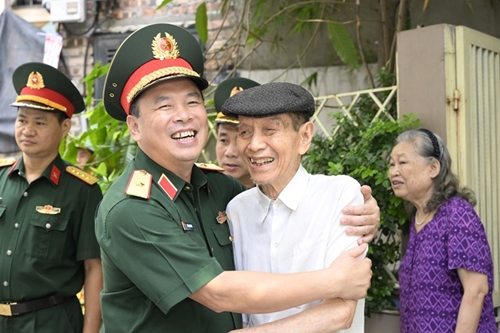Blood and scripts by trenches
“Phu Bang is still alive,” “Here comes Phu Bang!” During the nine years of the resistance war against the French colonialists, his comrades shouted that after each battle and campaign.
Pham Phu Bang always rushed to fierce battles, headed to places where gunfire was echoed.
In the fierce battle on Canh Dieu - Non Nuoc mountains in Ninh Binh, lightly-wounded, Bang kept standing side-by-side with a unit in the fight to cover the information, even though the enemy overwhelmed in terms of force and firepower. When ordered to retreat, they cleverly escaped the siege. After this battle, Bang was awarded the first order in his military career.
    |
 |
|
Editor-in-Chief of the People’s Army Newspaper Major General Doan Xuan Bo and other leaders of the newspaper visit Pham Phu Bang on the occasion of the Vietnam Revolutionary Press Day in June 2023. |
He followed troops in campaigns named Tay Bac (Northwest), and Upper Laos. In the Upper Laos campaign, he walked and ran after Division 308 for dozens of consecutive days, getting hungry and so exhausted that he was going to die without a bowl of porridge and medicine.
In the Mau Than 1968 Tet Offensive and Uprising, he nearly died many times. He was heavily injured in a battle, and his comrades found him barely breathing among bodies. That heavy wound left lifelong after-effects on him, so he had to be treated at intensive care unit whenever he suffered a relapse.
In spring 1973, when the Paris Agreement was signed, he was present in the theater again after a long period of time working in the Southern theater with the duty of building the Liberation Army Newspaper.
In his life, Pham Phu Bang could not forget his days and nights in the trenches in Dien Bien Phu. He made news, reports on the march, or right at Muong Phang Commanding Post. When an issue was printed, he went through mountains and forests to the battlefields to read for troops and then listen to their stories. In the 33-issues of the People’s Army Newspaper on the Dien Bien Phu front, there were a number of articles written by Pham Phu Bang.
Clear-sightedness and acumen
Pham Phu Bang had a timely presence in Doc Lap (Independence) Palace on April 30, 1975. He then joined other reporters to head for the Southwestern region. He, in the ranking of Major, accepted the surrender of a commanding officer and soldiers on an enemy frigate at Ca Mau military port.
It was his bravery, clear-sightedness and acumen that helped Pham Phu Bang give timely and accurate judgments and decisions during his press life.
In 1978 and 1979, no one knew where Bang was, while most of reporters went to different places in the Southwestern, Northern border areas and Cambodia. Surprisingly, on the front page of the New Year issue of the People’s Army Newspaper in 1979, there appeared an article named “A warm spring” about Angkor and Vietnamese volunteer troops written by Bang. Later on, his series entitled “Cambodia – betrayal” gave a deep look into Cambodia and demonstrated his careful and diligent collection of information.
New topics for articles often flashed in his mind and he sometimes shared them with his colleagues.
Bang was also a person constantly longing for knowledge. When he studied at the Journalism Department of Beijing University, he saved money to travel throughout China to learn more about the East Asian country and the relations between Vietnam and China. He also studied English and French on his own with the aim of communicating with foreigners to understand the enemy in the theater. He said that the French language he learned was the French from trenches.
Many intellectuals, scholars, knowledge-lovers, writers and poets and generations of editors-in-chief of the People’s Army Newspaper liked talking to Bang and asking for his opinions.
Simple in daily life
What always accompanied him after his retirement was a camera. He loved taking photos of people he met on streets and places he passed by. He actively participated in the Vietnam - Sweden Cultural Foundation and visited historical relic sites in border areas to make files to protect them. He also donated money to other cultural preservation activities.
It was impossible to count exactly how many times he was absent from his home for trips to mountainous areas to give support to needy villages and schools there. He kept going if he was able to. When he was in weak health conditions, his children and grandchildren did on behalf of him.
Translated by Mai Huong